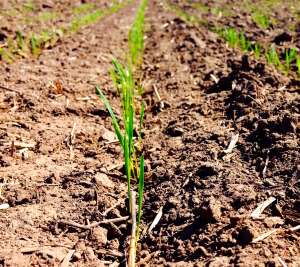More Seed for Sowing

We need to feel the free wind of generosity in our day of careful financial planning.
Let me explain.
It’s the spring of the year AD 55 and the weather is warming up in Ephesus. The apostle Paul is on his third missionary trip. This time, along with his usual burden for the growth of the churches, he carries with him another burden—one for the churches of Judea, who are poor and struggling to make ends meet. He is hopeful of using this trip, in part, to collect resources to take back to them. So, here in Ephesus, as he sits down to write a letter to the church of Corinth, his pen turns to the subject of generosity.
The issue takes up a fairly lengthy portion of the letter (2nd Corinthians 8-9) as he engages several arguments to urge the Corinthians to give. As it turns out, the Corinthians had become aware of the poverty of the Judean churches a year before and had responded with excitement and promises of generosity. Paul asks them to finish what they started by following up their words with actions. He further tries to animate them with the example of the Macedonian churches (e.g. Philippi, Thessalonica, Berea), who had given even beyond their own means in an outburst of liberality. Alongside this example, he also brings to bear the even greater example of Christ, who was rich, but for the sake of the Corinthians became poor, so that they might become rich.
Paul’s goal in all of this is that the Corinthians would give freely, abundantly, and cheerfully. To that end he outlines a principle near the end of chapter 9: And God is able to make all grace abound to you, so that having all sufficiency in all things at all times, you may have an abundance for every good deed. (2nd Corinthians 9:8)
This is the principle: God can give you enough for your needs and an abundance to give away.
Most of us in the U.S. have enough for our own needs plus something left over. In God’s economy, that something-left-over should be used to meet someone else’s needs (see 2nd Corinthians 8:12-15 for more on this). This surplus is the “abundance for every good deed” that he talks about. Paul is saying that God can keep filling up your something-left-over so that you never lack enough to give. And when he says, “having all sufficiency in all things at all times,” he means that God can provide enough for your own needs as well.
Enough for yourself, and an abundance to give away. That’s what God can provide.
Paul continues to explain:
As it is written, “He has distributed freely, he has given to the poor; his righteousness endures forever.” He who supplies seed to the sower and bread for food will supply and multiply your seed for sowing and increase the harvest of your righteousness. (2 Cor 9:9-10)
The analogy here is of a farmer where planting seed is equivalent to giving. He says that God, the Master Farm Supplier, will both supply and multiply their seed for sowing. That’s quite an intriguing statement. Not only does God provide for us the surplus that we have to give, he multiplies it! Once we finish up planting one bag of seed, we go back to the Supplier and He gives us two bags. The more we give, the more we have to give.
And the harvest that we reap is an eternal one. Picking up on his quote from Psalm 112, “His righteousness endures forever,” he says, “[God] will increase the harvest of your righteousness.” Perhaps this refers to God’s recognition and reward of the generous person. Temporal sowing produces eternal rewards.
As I said, we need to change the way we think in our day of careful financial planning. I’m all for it, but let’s plan with the Bible in hand. Do we view our surpluses as seed for sowing? Do we give freely and fearlessly, knowing that it is God who provides what we have to give and it is He who will even multiply it as we use it for His work? Do we get excited by the hope of the eternal harvest that this generous planting will bring?
We should. And we can.
Paul is opening to us a wide doorway to a new kind of economy where we are free to give and free to trust. Out here, the seed bags never run out and all that we have to do is to plant, hum a tune, and wait for the harvest.
Hear Paul’s next words as a fitting summary.
You will be enriched in every way to be generous in every way.

